These 15 Mexican Films Will Help Your Spanish Before You Head to Mexico City

Do you want to learn Spanish naturally just by watching videos? You can absolutely do exactly that. One of the most enjoyable ways I’ve found to improve my language skills is by watching movies. Choosing movies from the country you're interested in traveling to can help your Spanish and give you a leg up on the social customs of the place.
If you’re traveling to Mexico City or dream about using your Spanish there, what better way than to do a deep dive into Mexican film? Mexico, along with Cuba and Argentina, has one of the most storied and developed film industries in Latin America.
Are you into classic black and white films? In this article, there are a couple of recommendations from the Golden Age of Cine Mexicano, from the 1940s and 50’s. Movies like Los Olvidados have gritty storylines that will leave you breathless.
Most of the movies on this Top 15 List are from this century. The 2000’s saw a resurgence of Mexico as a top player in motion pictures with movies like the coming-of-age blockbuster Y Tu Mamá También.
If you are more into series and reality shows, you’ll definitely find a ton of options on your favorite streaming service. There’s so much good (and so-bad-it’s-good) content out there that you’ll never run out of stuff to binge. I’m looking at you Love Is Blind fans. Please, definitely watch Love Is Blind: Mexico as you’ll hear accents from all different parts of the country.
In this article, instead of series and reality shows, we are going to give you a curated list of feature films to provide you with the perfect plan for this upcoming weekend. So, grab your bowl of popcorn and find the remote. We’ve got you covered with this list of 15 top-notch Mexican movie recs to help improve your Spanish.
Table of Contents
- Introduction: Learn Spanish with Mexican Cinema
- Why Mexican Cinema?
- Tips for Maximizing Your Movie Viewing Experience
- Best Mexican Films to Watch Before Visiting Mexico City
- 🎬 Available on Netflix
- Y Tu Mamá También (2001)
- Lorena, La De Pies Ligeros [Light-Footed Woman] (2019)
- Pedro Páramo (2024)
- Roma (2018)
- El Club de los Insomnes aka El Refugio de los Insomnes (2018)
- Temporada de Patos [Duck Season] (2004)
- La Ley de Herodes [Herod’s Law] (1999)
- 🎬 Available on Amazon Prime Video
- No Se Aceptan Devoluciones [Instructions Not Included] (2013)
- Hecho en México [Made in Mexico] (2012)
- Amores Perros (2000)
- Los Olvidados [The Young and the Damned] (1950)
- Los Insólitos Peces Gato [The Amazing Catfish] (2013)
- Cantinflas (2014)
- Get it on DVD/Blu-Ray or Another Streaming Service
- Nosotros Los Nobles (2013)
- Watch Nosotros Los Pobres on the Internet Archive or Apple TV
- Nosotros Los Pobres (1948)
- 🎬 Available on Netflix
- Conclusion: Immerse Yourself in Mexican Cinema
Why Mexican Cinema?
Watching movies helps because you hear authentic accents to help give you a ton of inputs so that you start speaking beautiful Spanish more quickly. You’ll pick up on stuff you’d never see in a textbook. We’re talking real-life conversations with natural pacing, slang, colloquial expressions, and lexicon (the repertoire of vocabulary certain groups use). For example you will hear Julio and Tenoch in Y Tu Mamá También talk about going to “la alberca” as opposed to “la piscina” when referring to the swimming pool.
You’ll also pick up on cultural insights and humor that prepare you for all sorts of cool social dynamics when you are on the ground in CDMX (Ciudad de México).
Here are just some of the benefits of using Mexican movies to help you Spanish before going on your trip to Mexico City:
- Learn conversational Spanish in context with real Mexican speech instead of textbook phrases that might be outdated or might be specific to Spain or Colombia.
- Understand slang and colloquial expressions used daily in Mexico by all ages.
- Improve listening comprehension by hearing different accents and speaking speeds–train your ear to relax into the language. It’s the greatest language learning hack I know.
- It’s a million times more pleasing to the ear and more effective (see Dr. Krashen’s research) to see and hear characters going on adventures and having love affairs than to bash one’s head against the wall trying to cram grammar rules into the brain.
- Gain cultural awareness to navigate social situations in Mexico City–find out which hand gestures and curses might get you into trouble or which piropos (sweet pick-up lines) might get you a date.
- Exposure to formal vs. informal Spanish, helping you switch between casual and professional conversations. The “Tú vs. Usted” lesson has never been this fun before :)
Some tips on getting the most out of your movie viewing experience:
Netflix is the obvious winner here for language supports and scaffolding. And here’s why. When you click the subtitle option (see the dialogue icon below) you can choose “Spanish (Latin America) (CC)” to read the dialogue while you listen. The little timer icon allows you to adjust Playback Speed, if you need to slow it down.
If you are still working on your listening chops, you might want to watch once with English subtitles. Then a second time with Spanish subs. And finally (assuming you have a couple free Friday nights) original audio with no subtitles. This is a true scaffolded approach.
Or jump in the cold water so to speak, and watch with no subs right away. Test yourself and see what you can pick up. Your brain’s language processor is going to do some work and with an open-minded attitude, and maybe a drink and some snacks, you’re going to soak up the language.
You can take notes in a little vocabulary notebook. Fill it up with fun idiomatic expressions and any vocab you want to remember.
If you are an intermediate or advanced learner, you might also try shadowing (some studies show it can be beneficial) by mimicking lines out loud to improve your pronunciation.
Best Mexican Films to Watch Before Visiting Mexico City
🎬 Available on Netflix
1. Y Tu Mamá También (2001) – Road Trip & Coming-of-Age Classic (Drama, Romance, Friends’ Adventure) - 1hr 46m
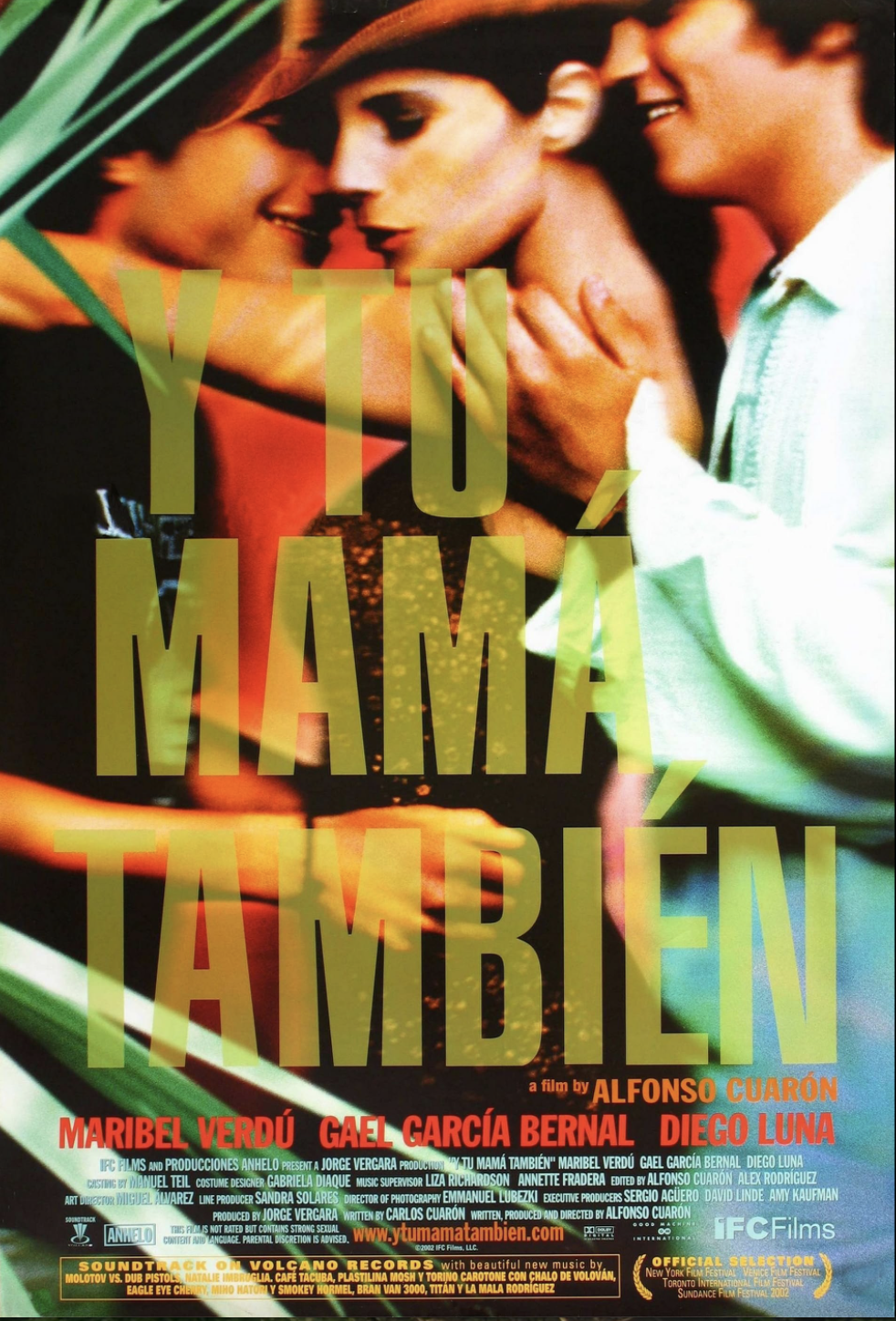
Check out all the IMDb stats on Y Tu Mamá También.
Watch Y Tu Mamá También on Netflix.
Privileged teen Tenoch and his working class friend Julio convince an older married woman, Luisa, to take a spontaneous road trip with them to a hidden beach in Oaxaca. Despite their selfishness, the boys have some personal discoveries. We also witness some extraordinarily balmy scenes. The voiceovers sprinkled throughout the action reveal to us the economic plight and corruption in Mexico.
The cinematography involves handheld camera work and natural dialogue. It’s helpful for your Spanish because it features youthful Mexican slang and regular, everyday speech. Y Tu Mamá can help you grasp informal conversations to help you sound like a natural in Mexico.
Here are a few key phrases from the movie to look out for:
- "No manches." (They actually say the vulgar version–see if you can spot it in the movie) – "No way!"/ “Are you kidding me?”
- "Güey" (pronounced like “way”)– "Dude" “Bro” (Very common among young Mexicans).
- "¿Y ahora qué hacemos?" – "And now what do we do?"
Directed by Alfonso Cuarón and released in 2001, Y Tu Mamá También is set primarily in Mexico City before the characters embark on a road trip through the countryside. One of the film’s standout early scenes takes place at a bullring, where the two young protagonists first meet Luisa. This scene is vibrant, filled with mariachis, elite party guests, and a heavy security presence. The scene captures the stark contrasts of Mexico’s social landscape.
From there, the trio sets off on a road trip, heading south through Oaxaca in search of the mythical Boca del Cielo beach.
The film’s main cast features a blend of Spanish and Mexican accents, offering an interesting linguistic contrast. Maribel Verdú, who plays Luisa, hails from Spain, making her speech notably different from that of Gael García Bernal and Diego Luna, the young Mexican actors who play the two restless amigos, Julio and Tenoch.
Recognized for its bold storytelling, Y Tu Mamá También received an Academy Award nomination for Best Original Screenplay, written by Alfonso Cuarón and Carlos Cuarón. The film also won Best Screenplay at the 2001 Venice Film Festival and was named Best Foreign Film by the New York Film Critics Circle.
2. Lorena, La De Pies Ligeros [Light-Footed Woman] (2019) – Inspirational Documentary Short (Biography, Sports) - 30m
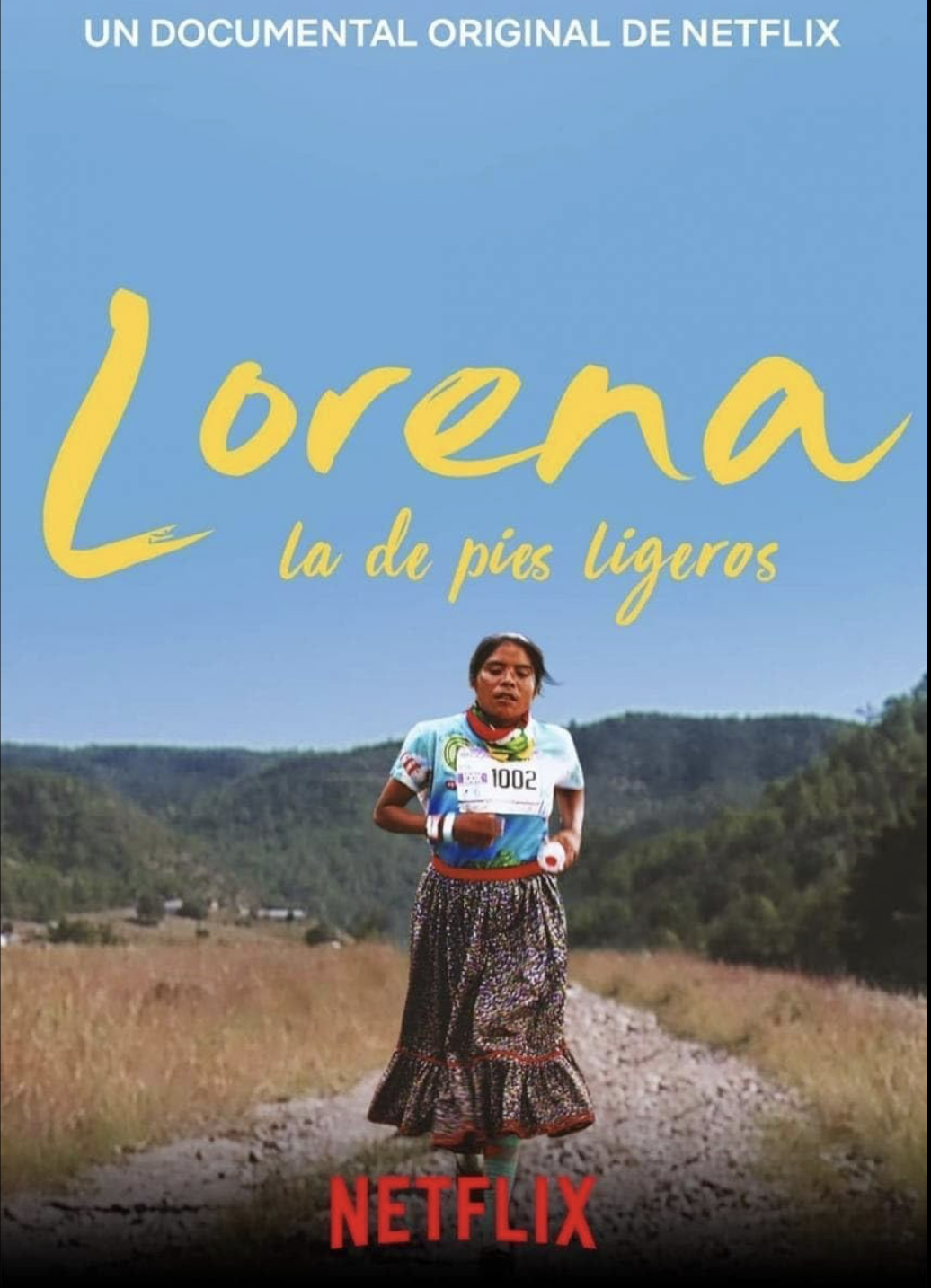
Check out all the IMDb stats on Lorena, Light-footed Woman.
Watch Lorena, Light-footed Woman on Netflix.
This documentary follows Lorena Ramírez, a member of the Rarámuri indigenous community, who competes in ultra-marathons wearing traditional sandals. The film explores her personal journey, cultural heritage, and determination to break barriers in a predominantly male-dominated sport.
This documentary is an inspiring and deeply moving look at Lorena Ramírez, a Rarámuri (Tarahumara) ultramarathon runner with incredible endurance. Filmed in an intimate, documentary style, it highlights her life, culture, and the sheer determination that drives her to run for miles through the rugged landscapes of Mexico.
If you're looking to improve your Spanish, this film is a great choice! You'll hear rural Mexican accents, as well as the Rarámuri language, giving you a deeper appreciation of indigenous culture and traditions. Plus, it’s packed with athletic and motivational vocabulary—perfect if you love sports or need a little inspiration.
Here are a few key phrases from the movie to look out for:
- "Voy a correr hasta el final." – "I’m going to run until the end."
- "Mis ancestros me han enseñado." – "My ancestors have taught me."
- "No importa el terreno." – "The terrain doesn't matter."
Directed by Juan Carlos Rulfo in 2019, this documentary takes you on a journey through some of Mexico’s most breathtaking landscapes, especially the rugged and remote Sierra Tarahumara in Chihuahua. It’s the perfect backdrop for an inspiring story of strength, culture, and endurance.
At the heart of the film is Lorena Ramírez, playing herself—no script, no special effects, just pure determination and passion. Her story is as real as it gets.
The film has earned well-deserved recognition, winning the Silver Ariel in 2020 for Best Short Documentary and making waves at film festivals around the world. It’s more than just a documentary—it’s a powerful tribute to resilience, tradition, and the human spirit. If you need a little motivation, this one’s a must-watch!
3. Pedro Páramo (2024) – A Haunting Adaptation of Juan Rulfo’s Classic (Drama, Magical Realism) - 2hr 10m
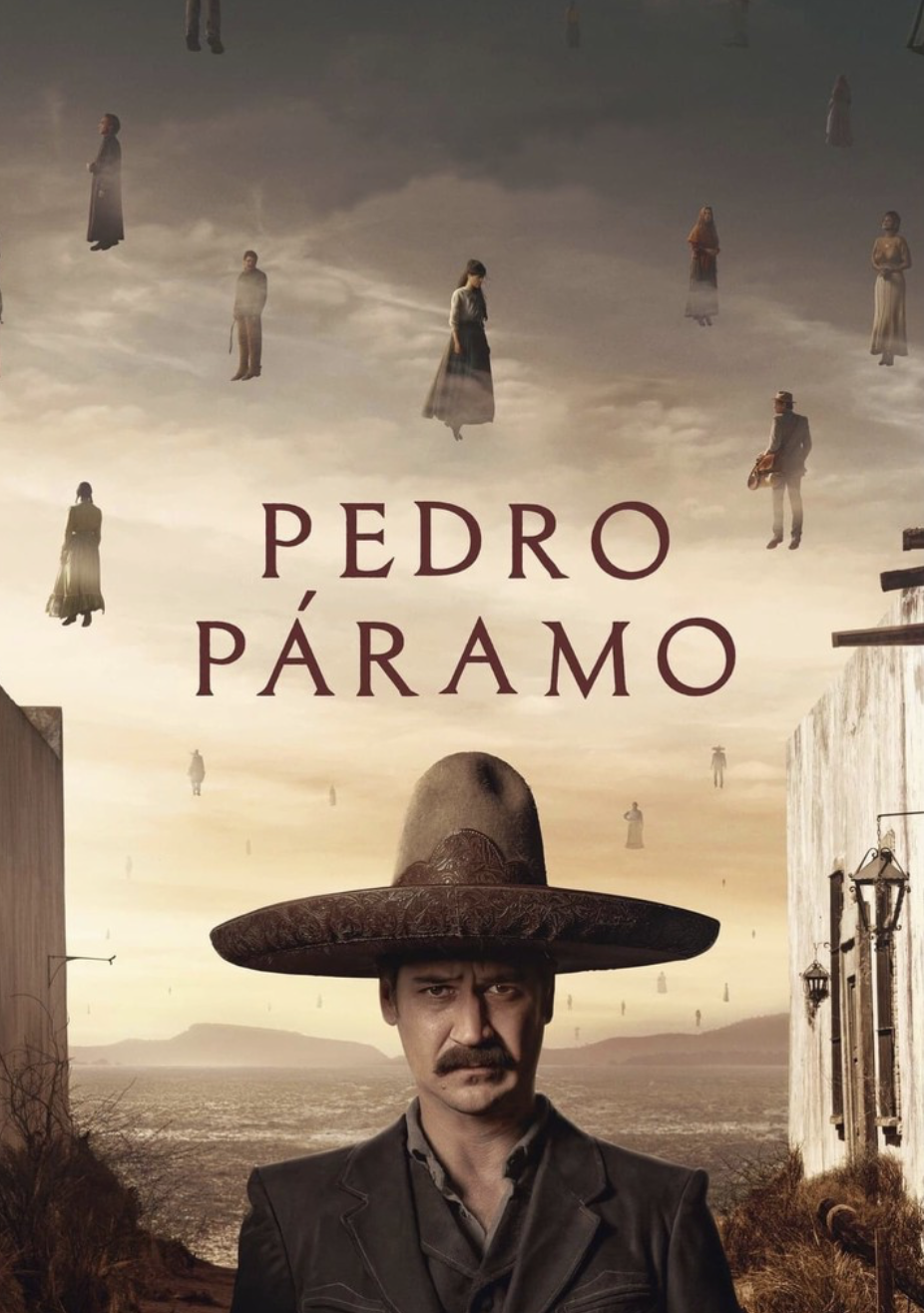
Check out all the IMDb stats on Pedro Páramo.
Watch Pedro Páramo on Netflix.
Based on Juan Rulfo’s iconic 1955 novel, Pedro Páramo follows Juan Preciado. He embarks on a journey to the ghostly town of Comala to fulfill his mother’s dying wish–finding his estranged father, Pedro Páramo. Upon arrival, Juan discovers a place filled with spirits, lost voices, and a dark past intertwined with his own.
This film is a beautiful blend of drama and magical realism, pulling you into a world that feels both mysterious and dreamlike. The storytelling is anything but straightforward. Expect shifting timelines, fragmented perspectives, and an eerie, almost otherworldly atmosphere that perfectly captures the ghostly town of Comala. It’s a movie that keeps you thinking long after the credits roll.
If you're looking to level up your Spanish, this is a fantastic pick! The dialogue is rich with classic literary Spanish, full of poetic and intricate expressions that give you a deep dive into Mexico’s cultural and linguistic history. Plus, you’ll hear Mexican rural dialects and historical speech patterns, making it an incredible way to broaden your understanding of how the language has evolved across time and regions. If you're a Spanish learner and love a story that lingers in your mind, this one is worth watching!
Here are a few key phrases from the movie to look out for:
- "Voy a Comala a ver a mi padre." – “I’m going to Comala to see my father.”
- "Aquí todo está muerto." – “Everything here is dead.”
- "Los murmullos nunca cesan." – “The whispers never stop.”
Directed by the talented Rodrigo Prieto, Pedro Páramo brings the hauntingly beautiful town of Comala to life—or rather, to the eerie, supernatural half-life it exists in. The film’s setting is steeped in mystery, where the past and present blur, and ghosts whisper their long-forgotten stories.
A special shoutout to costume designer Anna Terrazas, whose work is pure magic. Through carefully crafted period costumes and a striking color palette, she doesn’t just dress the characters—she transports us to another time and place, making us feel the weight of their emotions in every scene.
Meet the Cast:
- Manuel García-Rulfo plays the enigmatic Pedro Páramo
- Tenoch Huerta plays Juan Preciado, our guide through this ghostly world
- Dolores Heredia plays Eduviges, a key figure in unraveling Comala’s secrets
Where & When to Watch:
- The Theatrical Release premiered in Mexico on September 12, 2024.
- The International Netflix Release streamed worldwide on November 6, 2024. So no excuses. It’s right there waiting for you!
Awards & Recognition:
The film made waves at the 49th Toronto International Film Festival, earning a spot in the prestigious Platform Prize section. With its stunning visuals, gripping storytelling, and deep emotional pull, Pedro Páramo is a must-watch for fans of magical realism, literary adaptations, and films that stay with you long after they end.
4. Roma (2018) – A Cinematic Masterpiece (Drama, Semi-Autobiographical) - 2hr 15m
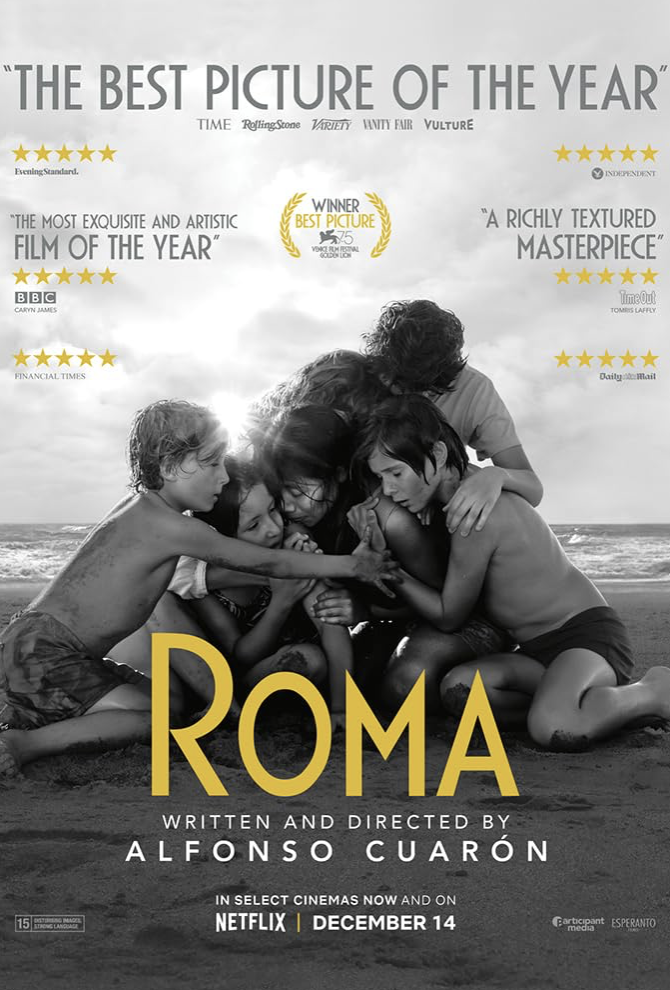
Check out all the IMDb stats on Roma.
Watch Roma on Netflix.
Get ready for an incredibly personal and heartfelt story with Roma. This film follows Cleo, an indigenous domestic worker in 1970s Mexico City, as she navigates the ups and downs of caring for an upper-class family—all while dealing with her own personal struggles. It’s a beautiful, immersive experience that pulls you into her world. Roma will deepen your understanding of Spanish, Mexican culture, and human relationships.
This film is a goldmine for anyone looking to hear authentic Spanish as it’s spoken across different social classes in Mexico. From the formal, polished speech of the upper class to the more relaxed, everyday conversations of working-class characters, the dialogue offers a rich learning experience. It’s a great way to pick up on accents, vocabulary, and the nuances of how people from different backgrounds communicate.
But Roma isn’t just about language—it’s about perspective. The film beautifully captures how lives intertwine, even when people come from vastly different worlds. It’s a deeply human story that highlights the connections, struggles, and unspoken bonds that shape everyday life.
Visually, it’s nothing short of a masterpiece. Shot in striking black-and-white, the film has an immersive, steady pace that pulls you in. The rich sound design and attention to detail transport you straight to 1970s Mexico, making you feel like you’re right there, walking the city streets and hearing the echoes of the past.
Here are a few key phrases from the movie to look out for:
- "Ahorita voy." – "I’m going right now." (Or maybe later, depending on context!)
- "Patrón/patrona" – "Boss" (common in domestic work settings).
- "Gracias por todo, señor." – "Thank you for everything, sir."
Directed by the brilliant Alfonso Cuarón, Roma (2018) brings Mexico City’s Colonia Roma neighborhood to life in a way that feels both deeply personal and universally moving.
Yalitza Aparicio delivers a stunning performance as Cleo, bringing quiet strength and deep emotion to the role. Her portrayal is both subtle and powerful, making her character’s journey feel incredibly real. Marina de Tavira also stands out, adding depth and complexity to her role as the mother of the family Cleo cares for. Together, their performances anchor the film’s emotional core.
The film’s brilliance didn’t go unnoticed. At the 2019 Academy Awards, it was nominated for Best Picture and won big in multiple categories, including Best Director, Best Foreign Language Film, and Best Cinematography—an incredible achievement. It also made waves in Mexico, taking home the top honor of Best Picture at the Ariel Awards, the country’s most prestigious film awards.
With its breathtaking cinematography and emotionally powerful storytelling, Roma isn’t just a movie—it’s an experience. Whether you’re here for the language, the culture, or just a masterfully told story, this film delivers on every level!
5. El Club de los Insomnes aka El Refugio de los Insomnes (2018) – Late Night Convenience Store Encounters (Drama, Slice of Life) - 1hr 20m
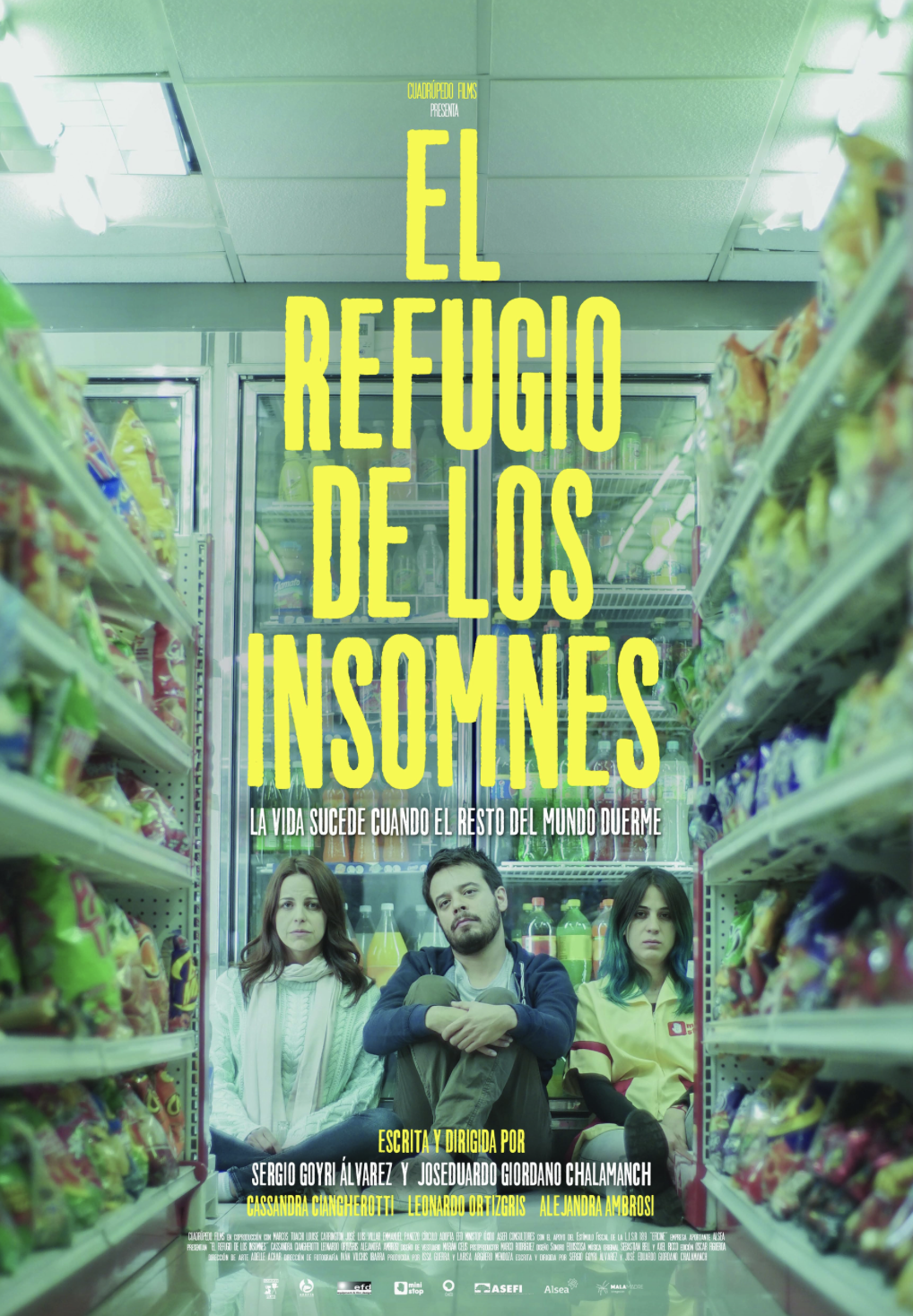
Check out all the IMDb stats on El Club de los Insomnes.
Watch El Club de los Insomnes on Netflix.
Santiago and Danny are two night owls battling insomnia, spending their sleepless hours hanging around a 24-hour convenience store. Their quiet, predictable routine takes a turn when they meet Estela, a veterinarian facing an unexpected pregnancy. What starts as a chance encounter slowly grows into an unlikely but deeply meaningful friendship, as the three navigate their personal struggles and loneliness together.
This film is a fantastic way to tune your ear to real, everyday Spanish. The dialogue is natural and unhurried, making it perfect for absorbing the rhythms of casual urban Mexican speech without feeling overwhelmed. It also beautifully captures how strangers open up to each other in quiet, unexpected ways, showing the small but powerful moments that build connection.
If you enjoy introspective, slow-paced films that focus on human relationships rather than big action sequences, then watch this one. It’s a quiet, thoughtful story that makes you pause, chuckle, reflect, and appreciate the beauty of everyday moments—perfect for both language learners and lovers of heartfelt storytelling.
Here are a few key phrases from the movie to look out for:
- "No puedo dormir." – "I can’t sleep."
- "Necesito pensar en mi vida." – "I need to think about my life."
- "¿Siempre vienes aquí?" – "Do you always come here?"
Director, Year, Setting: José Eduardo Giordano, 2018, Mexico City.
Main Cast: Cassandra Ciangherotti (Los Espookys) , Leonardo Ortizgris (Luis Miguel: The Series), Alejandra Ambrosi.
Awards & Recognitions: Recognized for strong performances and indie storytelling.
Cassandra Ciangherotti was nominated for best supporting actress at the 2019 Ariel Awards.
6. Temporada de Patos [Duck Season] (2004) - Nonchalant, Chill, Smile-Inducing - 1hr 30m
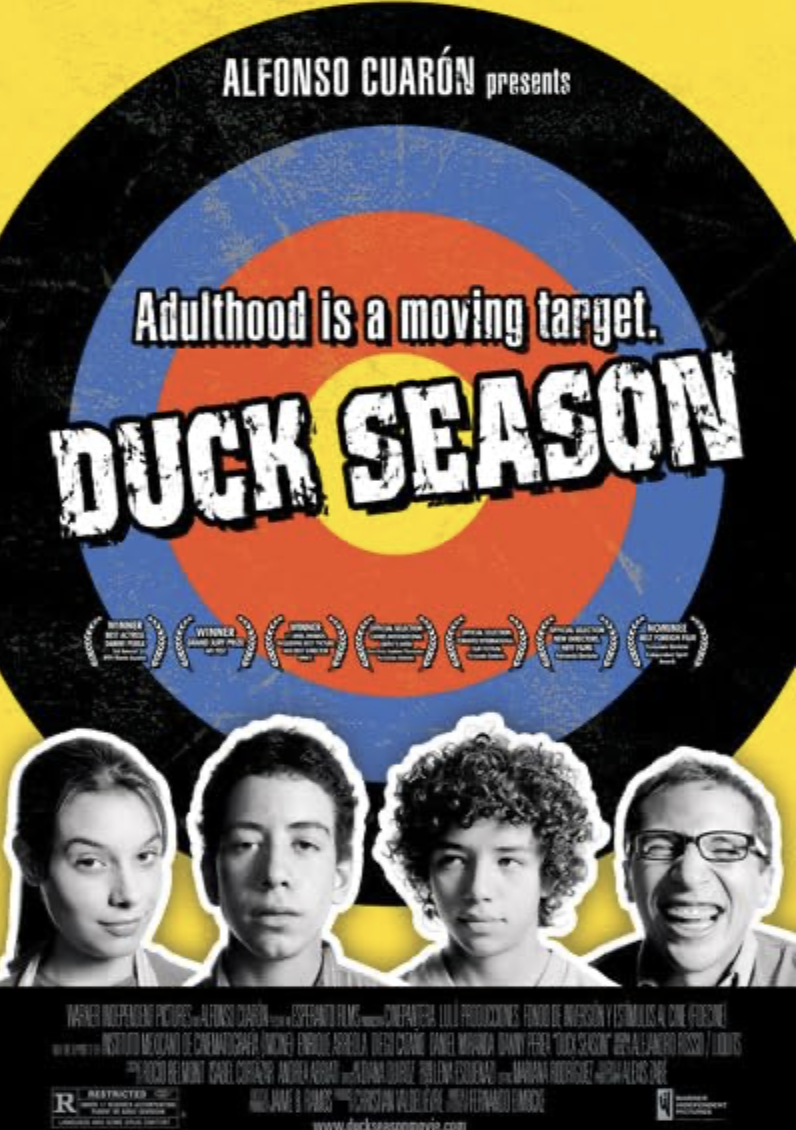
Check out all the IMDb stats on Duck Season.
Watch Duck Season on Netflix.
A black-and-white indie film about two 14 year old boys whose lazy Sunday afternoon turns into an unforgettable adventure when their electricity goes out, forcing them to interact with their quirky neighbor and an eccentric pizza delivery guy.
If you enjoy slice-of-life stories with a blend of comedy and drama, this film delivers natural dialogue and humor that feels effortless and real. It captures the casual, everyday speech of teenagers in Mexico City, making it an excellent choice for anyone interested in authentic, contemporary Spanish. More than just a linguistic experience, the film highlights the importance of human connection and the unexpected moments that shape our lives.
Here are a few key phrases from the movie to look out for:
- "¿Y ahora qué hacemos sin luz?" – "And now what do we do without power (light)?"
- "La pizza llegó fría." – "The pizza arrived cold."
- "No hay nada que hacer y eso es lo mejor." – "There’s nothing to do, and that’s the best part."
Directed by Fernando Eimbcke and released in 2004, the story unfolds in Mexico City with a cast that includes Diego Cataño, Daniel Miranda, and Enrique Arreola.
The film received widespread acclaim, including accolades from Alfonso Cuarón who opened the doors for the film to be shown in the USA. Cuarón said that he “fell in love with this movie and thought an American audience deserves to see something like this.”
It won multiple Ariel Awards in 2005, including Best Film, Best Director, Best Actor for Enrique Arreola, Best Actress for Danny Perea, and Best Original Screenplay. It also earned recognition from critics at Cannes and took home the Grand Jury Prize at AFI Fest.
7. La Ley de Herodes [Herod’s Law] (1999) – Political Satire (Comedy, Drama) - 2hr
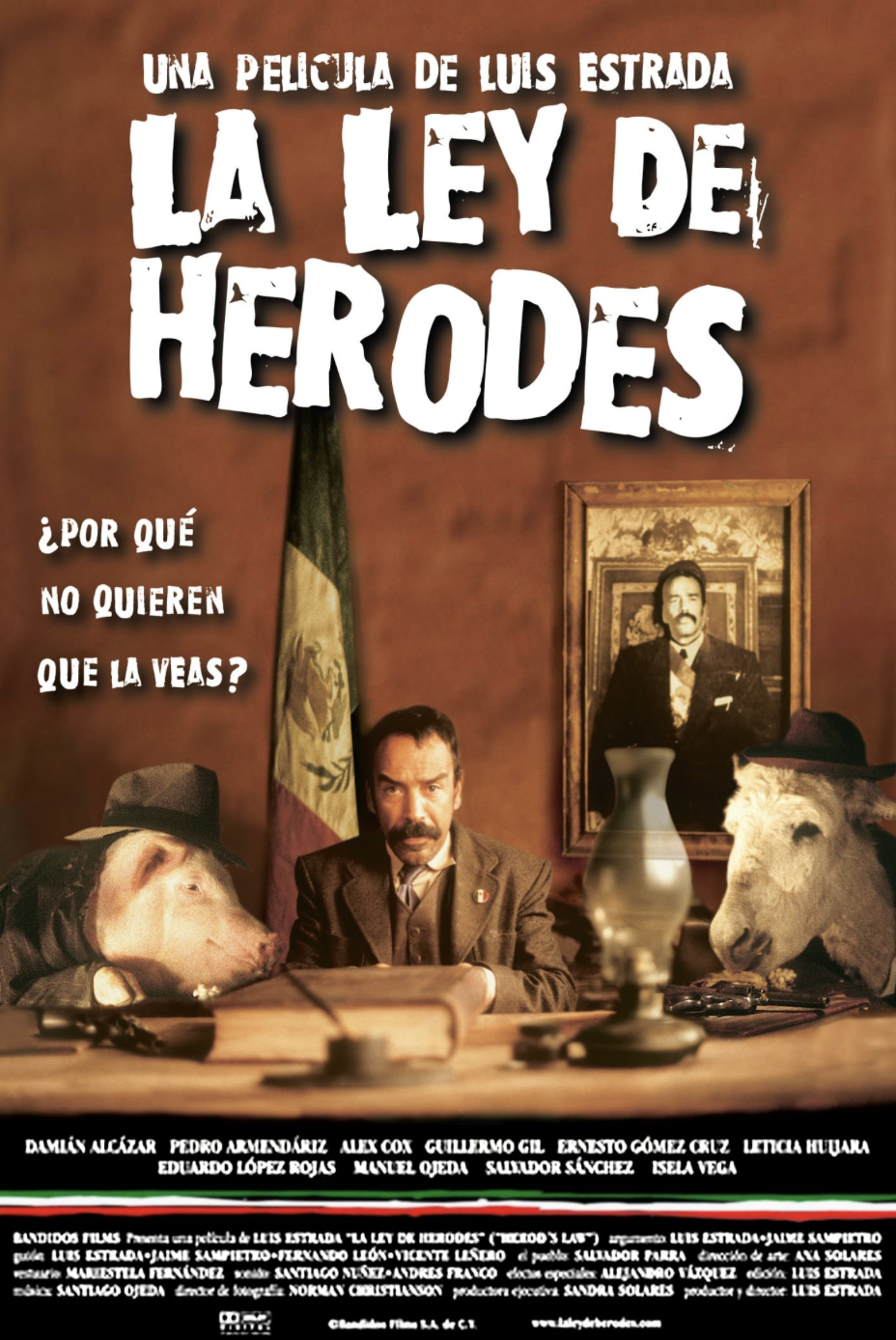
Check out all the IMDb stats on La Ley de Herodes.
Watch La Ley de Herodes on Netflix.
A satirical take on the corrupt politics of Mexico, this dark comedy follows a naïve man, Juan Vargas, who is appointed as mayor of a small town. As he gets drawn into the corrupt system, his ideals quickly erode, and he becomes a part of the political machinery he initially opposed.
This black comedy blends sharp political satire with a dark and cynical tone, creating a film that is both impactful and shocking. Its mood reflects the deep-rooted political corruption in Mexico, using humor as a tool to expose uncomfortable truths. Beneath the laughs, it delivers a biting critique of power and the way it operates in rural communities.
Beyond its political themes, the film is an excellent resource for anyone looking to improve their formal Spanish. With its frequent use of political slang and honorifics, viewers will come away with a firm grasp of the word licenciado and a mastery of usted conjugations. At the same time, it offers a compelling look at Mexican politics, corruption, and the social structures that sustain them.
Here are a few key phrases from the movie to look out for:
- "El que no transa, no avanza." – "He who doesn’t cheat, doesn’t get ahead."
- "Esto es lo que tenemos que hacer para sobrevivir." – "This is what we have to do to survive."
- "Te voy a hacer un favor." – "I’m going to do you a favor."
Directed by Luis Estrada and released in 1999, the film is set in a small Mexican town, capturing the intersection of rural life and political maneuvering. The cast features Damián Alcázar and Pedro Armendáriz Jr., both of whom deliver powerful performances.
The film won several major awards, including Best Picture, Best Director, and Best Actor for Alcázar at the 1999 Ariel Awards. It was also recognized internationally, winning Best Photography at the 45th Valladolid International Film Festival in 2000.
🎬 Available on Amazon Prime Video
8. No Se Aceptan Devoluciones [Instructions Not Included] (2013) – Family Drama (Comedy, Drama) - 2hr
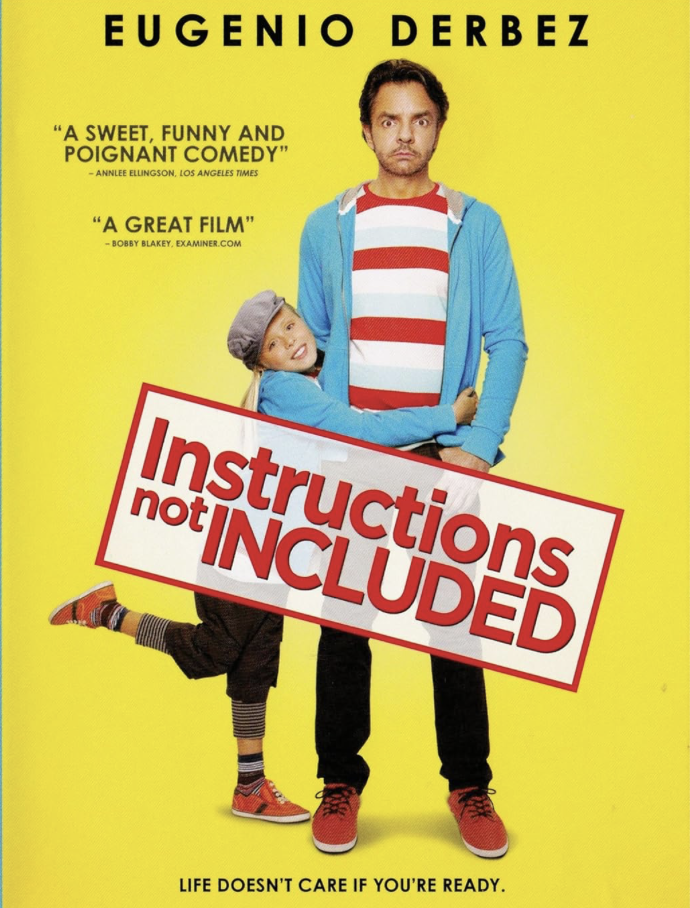
Check out all the IMDb stats on Instructions Not Included.
Watch Instructions Not Included on Amazon Prime Video.
Valentin, a carefree playboy and stuntman, discovers that he has a daughter named Maggie, from a one-night stand years ago. Determined to provide her with a stable life, he embarks on a journey of fatherhood, eventually realizing how much he has changed along the way.
This heartfelt blend of comedy and drama delivers an emotional yet light-hearted story that effortlessly shifts between humor and touching moments. With its mix of laughter and sentiment, the film explores themes of love, family, and personal growth while maintaining an uplifting and engaging tone.
Beyond its storytelling, the film is an excellent way to experience everyday Mexican Spanish and family dynamics. The dialogue is filled with both comedic and heartfelt expressions commonly heard in Mexican households, making it a great resource for those wanting to immerse themselves in the language and culture.
Here are a few key phrases from the movie to look out for:
- "Te amo, hija." – "I love you, daughter."
- "Lo único que quiero es verte feliz." – "All I want is to see you happy."
- "¡Esto no es una película, es la vida real!" – "This isn’t a movie, it’s real life!"
Directed by Eugenio Derbez and released in 2013, the film takes place across both Mexico and the United States, offering a thoughtful look at the challenges of immigrant life. Eugenio Derbez plays Valentin, the imaginative father of Maggie played by the endearing Loreto Peralta.
The film received widespread recognition, earning nominations for several awards, including Best Latin Comedy at the People’s Choice Awards.
9. Hecho en México [Made in Mexico] (2012) – Musical Documentary (Culture, Music) - 1hr 38m
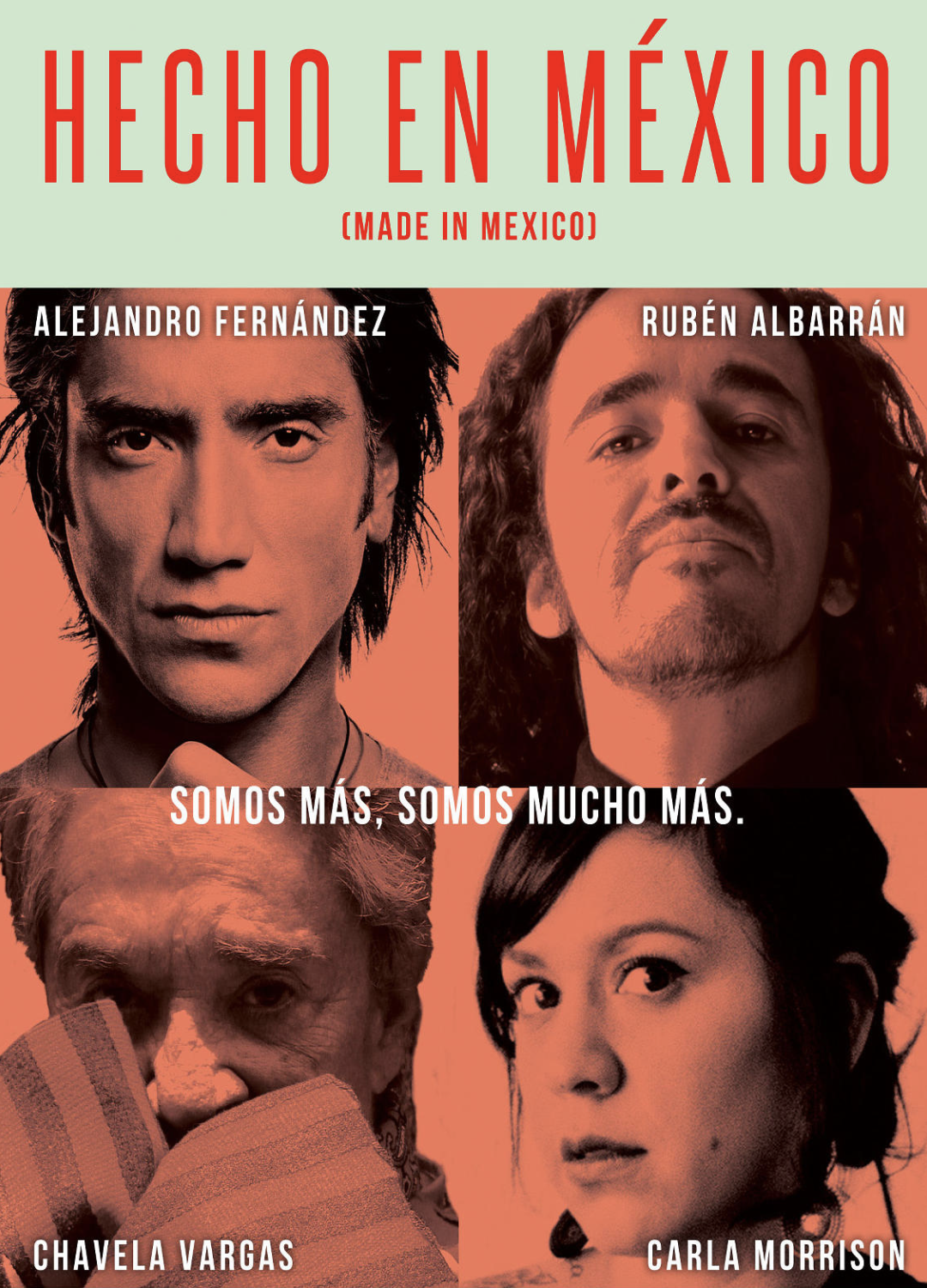
Check out all the IMDb stats on Hecho en México.
Watch Hecho en México on Amazon Prime Video.
This documentary takes a deep dive into Mexican culture and the powerful influence of music. Featuring interviews with famous artists and cultural icons, the film shows the evolution of Mexican music and its global impact.
This film is a vibrant and inspirational celebration of Mexican culture, told through a documentary-style blend of interviews and live performances. It captures the energy and spirit of music, tradition, and artistic expression, offering a rich and immersive experience for viewers.
Beyond its stunning performances, the film is a great way to pick up Mexican cultural expressions and vocabulary related to music, celebration, and tradition. It provides an authentic look at the rhythms and sounds that shape everyday life in Mexico, making it both an educational and deeply enjoyable watch.
Here are a few key phrases from the movie to look out for:
- "La música es el alma del pueblo." – "Music is the soul of the people."
- "Aquí todo es fiesta." – "Everything here is a party."
- "Esta es la melodía que nos une." – "This is the melody that unites us."
Directed by Duncan Bridgeman (photography) and Lynn Fainchtein (music), this film from 2012 takes viewers on a journey through various parts of Mexico, highlighting the country’s rich musical and cultural diversity. Featuring interviews with some of Mexico’s most renowned musicians and artists, it offers a firsthand perspective on the significance of music in Mexican identity.
The film earned nominations for several cultural film awards, further solidifying its impact as a tribute to the nation’s artistic heritage.
With its infectious energy and deep cultural roots, this documentary is a must-watch for anyone who loves music and wants to experience the spirit of Mexico with multiple senses.
10. Amores Perros (2000) – A Pivotal Mexican Film (Drama, Thriller) - 2h 34m
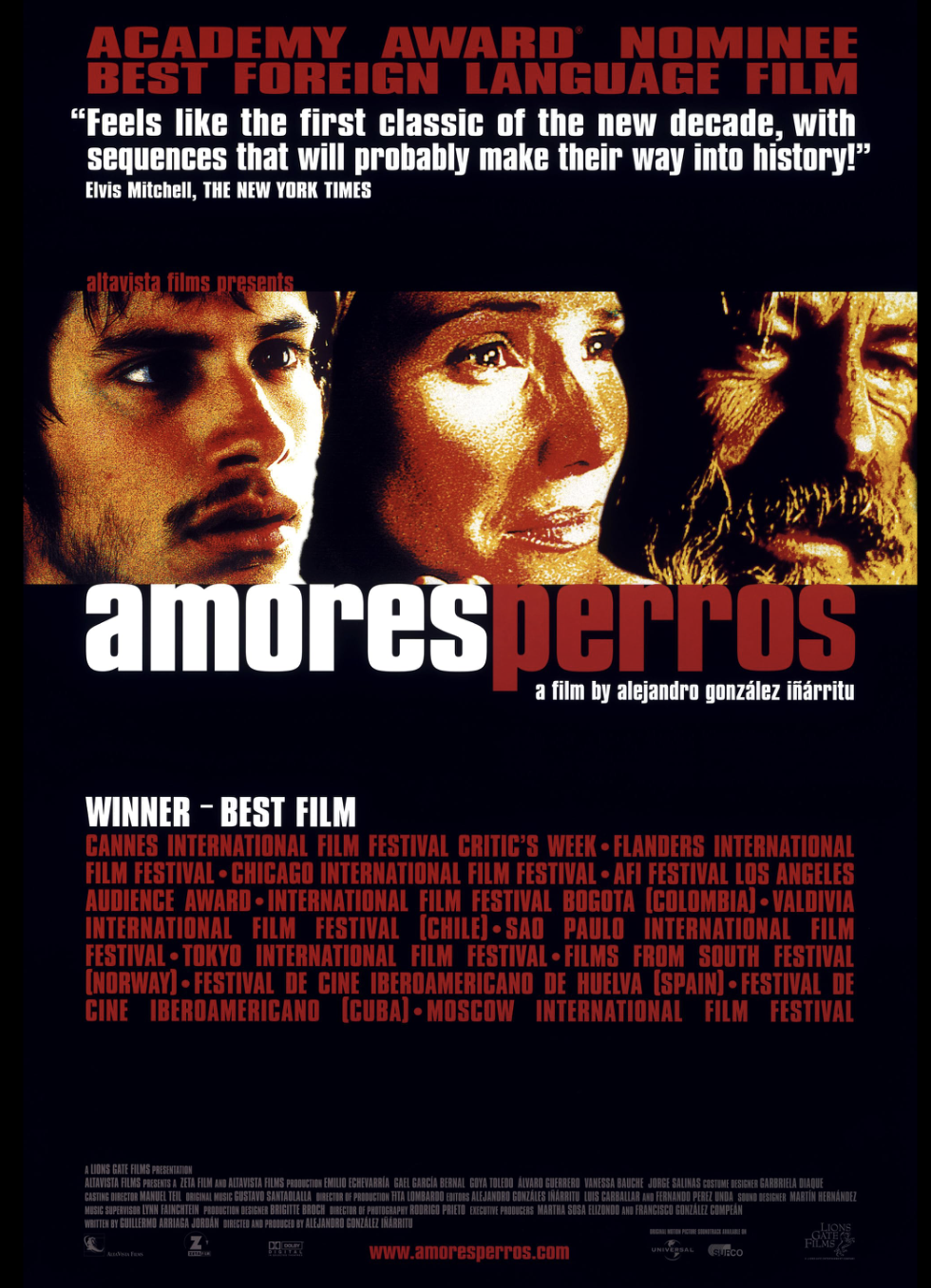
Check out all the IMDb stats on Amores Perros.
Watch Amores Perros on Amazon Prime Video.
This movie (and its amazing soundtrack) defined a generation and truly brought the Mexican film industry back into the conversation around the world. It’s also a personal favorite, as it was one of the first movies I chose to watch in order to learn Spanish and see what all the buzz was about.
This dark and gritty film interweaves three stories revolving around love, loss, and violence in Mexico City. At the heart of it is a car accident that connects the characters' fates, revealing the deep impact of human emotion and the struggle for survival.
This dark and unflinching film weaves together three interconnected stories of love, loss, and violence, all set against the backdrop of Mexico City. At the center of it all is a devastating car accident that ties the characters' fates together, exposing the raw intensity of human emotions and the harsh realities of survival in an unforgiving urban landscape.
Gritty and deeply realistic, the film captures the struggles of everyday life with a tone that is both emotionally charged and brutally honest. Its raw storytelling and urban tension make for a gripping experience that doesn’t shy away from the complexities of class disparity, desperation, and human resilience.
For language learners, the film offers an authentic look at Spanish as it’s spoken on the streets of Mexico City, filled with slang, fast-paced dialogue, and real-life urban dialects. At the same time, it serves as a powerful exploration of social issues, shedding light on the deep divides and shared struggles within the city.
Here are a few key phrases from the movie to look out for:
- "¿Qué pedo?" – "What’s up?" [Literally “What fart?”...it’s very informal]
- "No me importa." – "I don’t care."
- "La vida no es justa." – "Life’s not fair."
Directed by Alejandro González Iñárritu and released in 2000, the film is set in the chaotic and unforgiving streets of Mexico’s capital. It features standout performances from Gael García Bernal, Emilio Echevarría, and Vanessa Bauche.
The film earned international acclaim, including a nomination for Best Foreign Language Film at the Academy Awards and multiple wins at the Cannes Film Festival.
11. Los Olvidados [The Young and the Damned] (1950)– A Landmark in Mexican Cinema (Drama) - 1h 20m
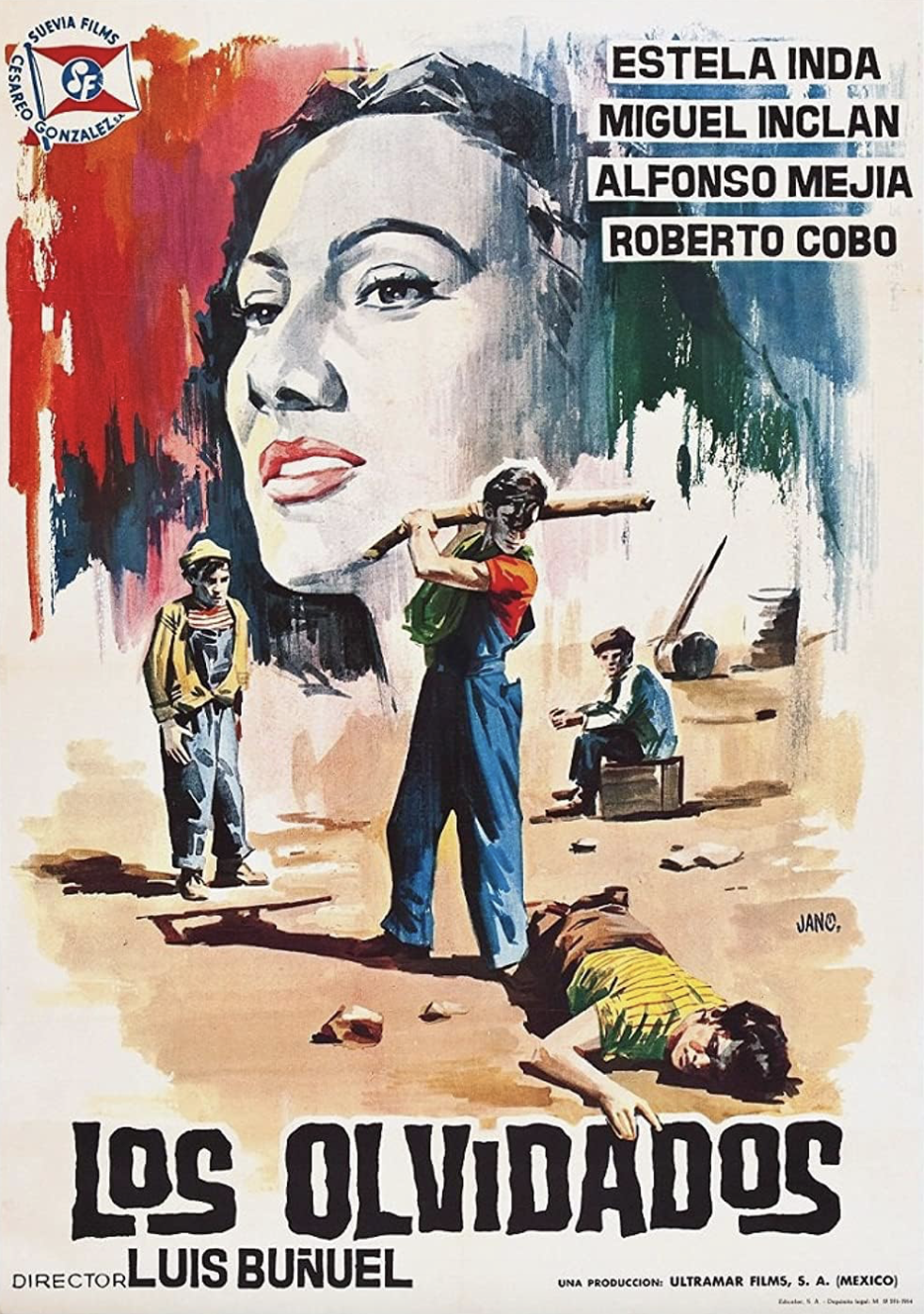
Check out all the IMDb stats on Los Olvidados.
Watch Los Olvidados on Amazon Prime Video.
Directed by Luis Buñuel, this film portrays the harsh lives of poor children in the slums of Mexico City. It focuses on the struggle for survival and the lack of hope for the young characters, contrasting their dreams with the brutal realities of poverty.
This powerful and unflinching film captures the harsh realities of life for children in the slums of Mexico City (at the time referred to as México “DF”–Distrito Federal). Directed by Luis Buñuel (Spanish republicano who moved to México DF to flee Franco’s regime), it tells a heartbreaking story of survival, following young characters whose dreams are constantly at odds with the brutal conditions of poverty. With little hope for a better future, their struggles paint a stark picture of social inequality and the cycle of hardship that defines their world.
Rooted in social realism, the film takes an unfiltered look at childhood through the lens of poverty, delivering an emotionally challenging yet deeply moving experience. Its raw and harrowing storytelling offers a glimpse into a side of Mexico City rarely seen on screen, making it both a compelling drama and an essential reflection on social issues.
For language learners, the film provides a valuable opportunity to hear Spanish as it was spoken in the mid-20th century, offering insight into historical expressions and working-class dialogue. At the same time, it serves as a powerful exploration of Mexico’s lower class, shedding light on the harsh conditions and societal struggles that continue to resonate today.
Here are a few key phrases from the movie to look out for:
- "La vida es cruel." – "Life is cruel."
- "Aquí no hay futuro." – "There’s no future here."
- "¿Qué vas a hacer con tu vida?" – "What are you going to do with your life?"
Released in 1950, the film is set in the slums of Mexico City and features unforgettable performances by Alfonso Mejía and Estela Inda.
Its impact was widely recognized, earning Luis Buñuel the Best Director Award at the Cannes Film Festival.
12. Los Insólitos Peces Gato [The Amazing Catfish] (2013) – Heartwarming Drama (Drama, Comedy) - 1h 30m
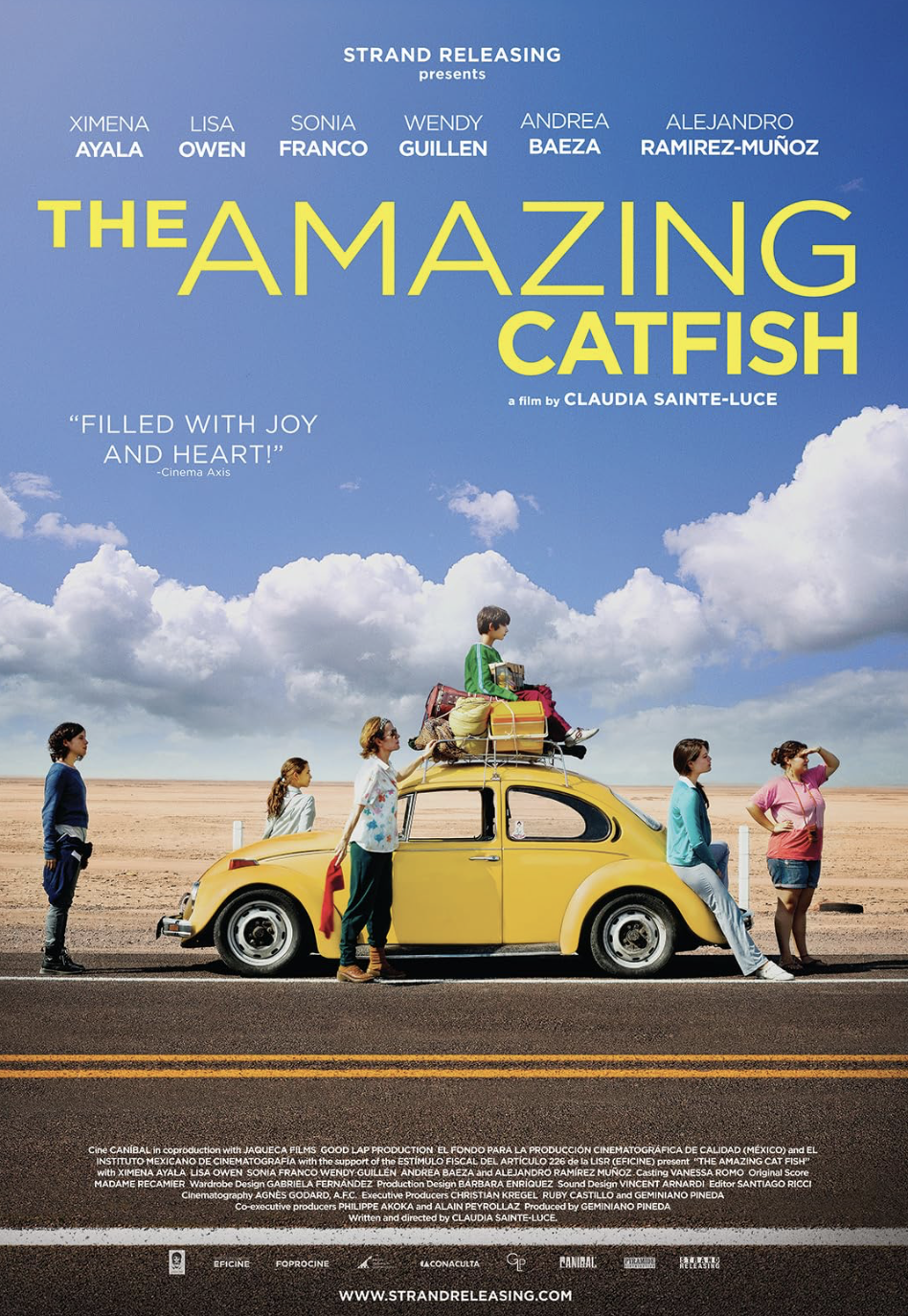
Check out all the IMDb stats on Los Insólitos Peces Gato.
Watch Los Insólitos Peces Gato on Amazon Prime Video.
After a troubled encounter with a medical diagnosis, the young Claudia starts living with a strange, unconventional family. As she bonds with them, they face challenges together, learning to cope with personal demons and moving toward healing.
This intimate and heartfelt film follows Claudia, a young woman whose life takes an unexpected turn after receiving a troubling medical diagnosis. Seeking connection, she finds herself living with an unconventional family, and as they navigate life’s struggles together, they form deep bonds that help them face their personal demons. Through moments of humor, hardship, and quiet resilience, the film explores the power of found family and the journey toward healing.
With a tone that is both quirky and introspective, the film strikes a delicate balance between light comedy and emotional depth. Its warmth and sincerity make it a touching exploration of human relationships, filled with small but meaningful moments that leave a lasting impression.
For those looking to immerse themselves in everyday Mexican Spanish, the film provides an authentic mix of casual conversation and emotional expression. At the same time, it offers a thoughtful look at contemporary themes such as illness, family dynamics, and personal growth, making it a moving and relatable experience.
Here are a few key phrases from the movie to look out for:
- "¿A qué le tienes miedo?" – "What are you afraid of?"
- "La vida es rara, ¿no?" – "Life is strange, huh?"
- "Estoy aquí para ti." – "I’m here for you."
Directed by Claudia Sainte-Luce and released in 2013, the film is set in Mexico and focuses on the intimate details of daily life. It features standout performances from Sonia Couoh and Ximena Ayala.
The movie earned widespread recognition, winning Best Film at the Mexican Academy Awards and Best Mexican Film at the Guadalajara International Film Festival.
With its heartfelt storytelling and rich emotional layers, this film is a beautiful reminder of the strength found in human connection.
13. Cantinflas (2014) – Biographical Comedy (Comedy, Drama) - 1hr 46m
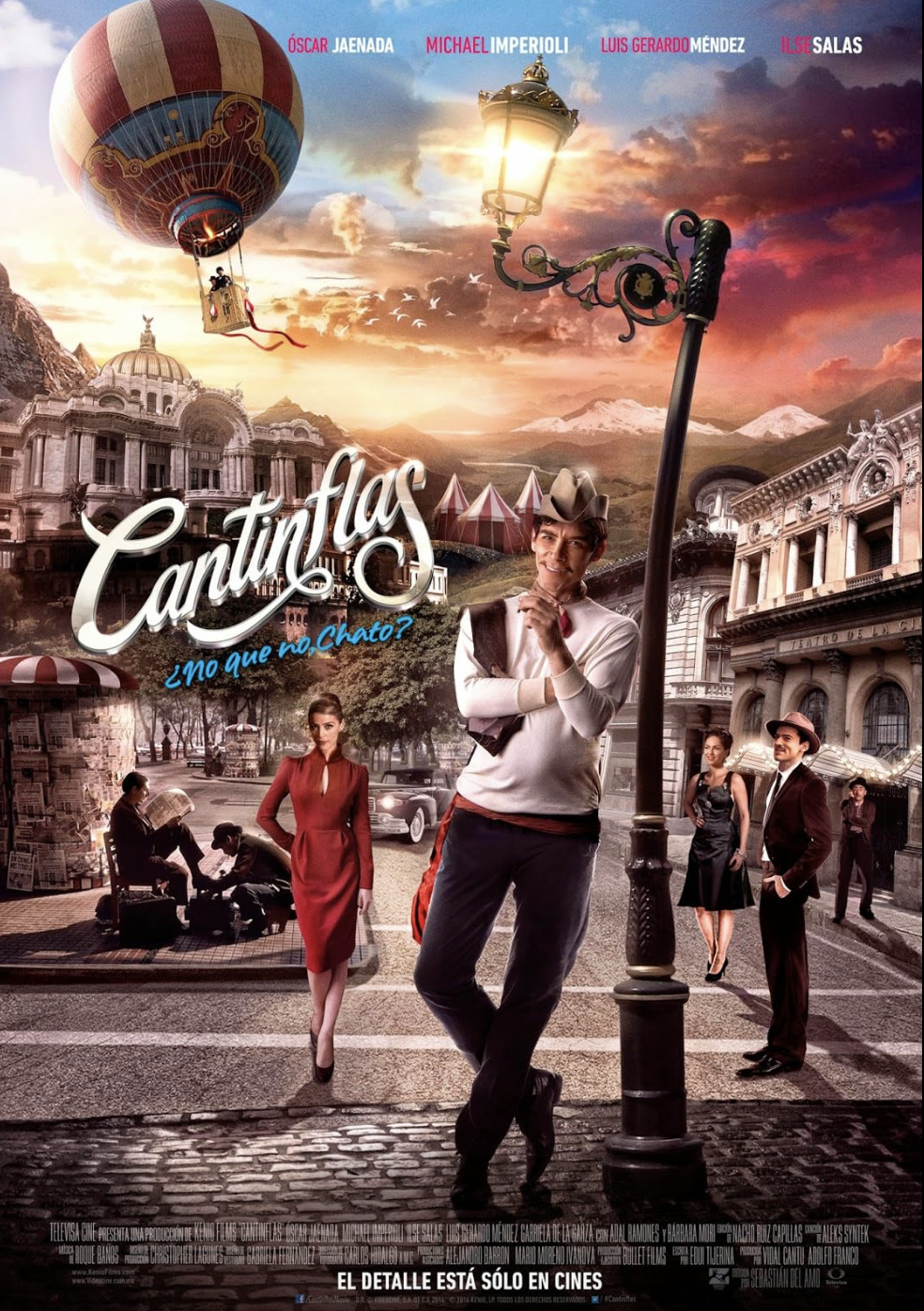
Check out all the IMDb stats on Cantinflas.
Watch Cantinflas on Amazon Prime Video.
This film tells the life story of the legendary Mexican comedian Mario Moreno, known as Cantinflas, often referred to as the Charlie Chaplin of Mexico. Through comedic moments and touching personal challenges, it chronicles his rise to fame and impact on Mexican cinema and culture.
By the way, if you want to watch an original Cantinflas comedy in original Spanish, you should watch Ahí Está El Detalle (1940) [You’re Missing the Point, directed by Juan Bustillo Oros, and 86% Popcornmeter on Rotten Tomatoes] about a lazy guy that mooches off of a rich gentleman where his girlfriend works. There’s adultery, murder, and so much confusion that is typical of the Cantinflas form of speaking and humor.
Or you can try a late-career film El Profe (from 1970 with 82% Popcornmeter on Rotten Tomatoes) where the Cantinflas character is assigned to teach at a school in a small town. Your choices for picking a film are many since Mario Moreno (Cantinflas) starred in over 55 films throughout his lifetime!
This captivating biographical drama brings to life the story of Mario Moreno, better known as Cantinflas, one of Mexico’s most beloved comedians. Through a mix of humor and heartfelt moments, the film traces his journey from humble beginnings to international fame, showcasing both the charm that made him a cultural icon and the personal challenges he faced along the way. As it unfolds, the film highlights his lasting impact on Mexican cinema and the legacy of his unique comedic style.
Balancing lighthearted comedy with the deeper struggles that come with success, the film captures the essence of Cantinflas’ humor while also exploring the pressures of fame. It’s an engaging and nostalgic look at one of Mexico’s most influential entertainers, blending laughter with an honest portrayal of his life.
For those interested in Mexican comedy, the film is a great introduction to Cantinflas’ signature wordplay and clever dialogue. It offers insight into cultural references tied to his humor, making it a fun and educational watch for anyone looking to understand the language of comedy in Mexico.
Here are a few key phrases from the movie to look out for:
- "¿Sabes qué?" – "You know what?"
- "Eso no tiene nada que ver." – "That has nothing to do with it."
- "Soy Cantinflas, el más grande." – "I’m Cantinflas, the greatest."
Directed by Sebastián del Amo and released in 2014, the film takes viewers through key moments in Mario Moreno’s life, set across various locations that shaped his career.
Óscar Jaenada is actually Spanish but plays the Mexican Cantinflas to a T. Michael Imperioli (Sopranos) plays Mike Todd, the film producer that “discovers” Mario Moreno aka Cantinflas for his Hollywood breakout in Around the World in 80 Days (1956). Mario’s love interest Valentina Ivanova is played by Mexico City native Ilse Salas (Las Niñas Bien, Pedro Páramo).
The film received critical recognition, including a nomination for Best Actor (Óscar Jaenada) at the 2015 Premios Ariel. It won 3 Ariel awards: Best Art Direction (Christopher Lagunes), Best Costume Design, and Best Make-Up.
With its mix of humor, nostalgia, and emotional depth, this film is both a tribute to Cantinflas and a celebration of the power of laughter.
Get it on DVD/Blu-Ray or Another Streaming Service
14. Nosotros Los Nobles (2013) – Comedy (Comedy, Family) - 1hr 48m
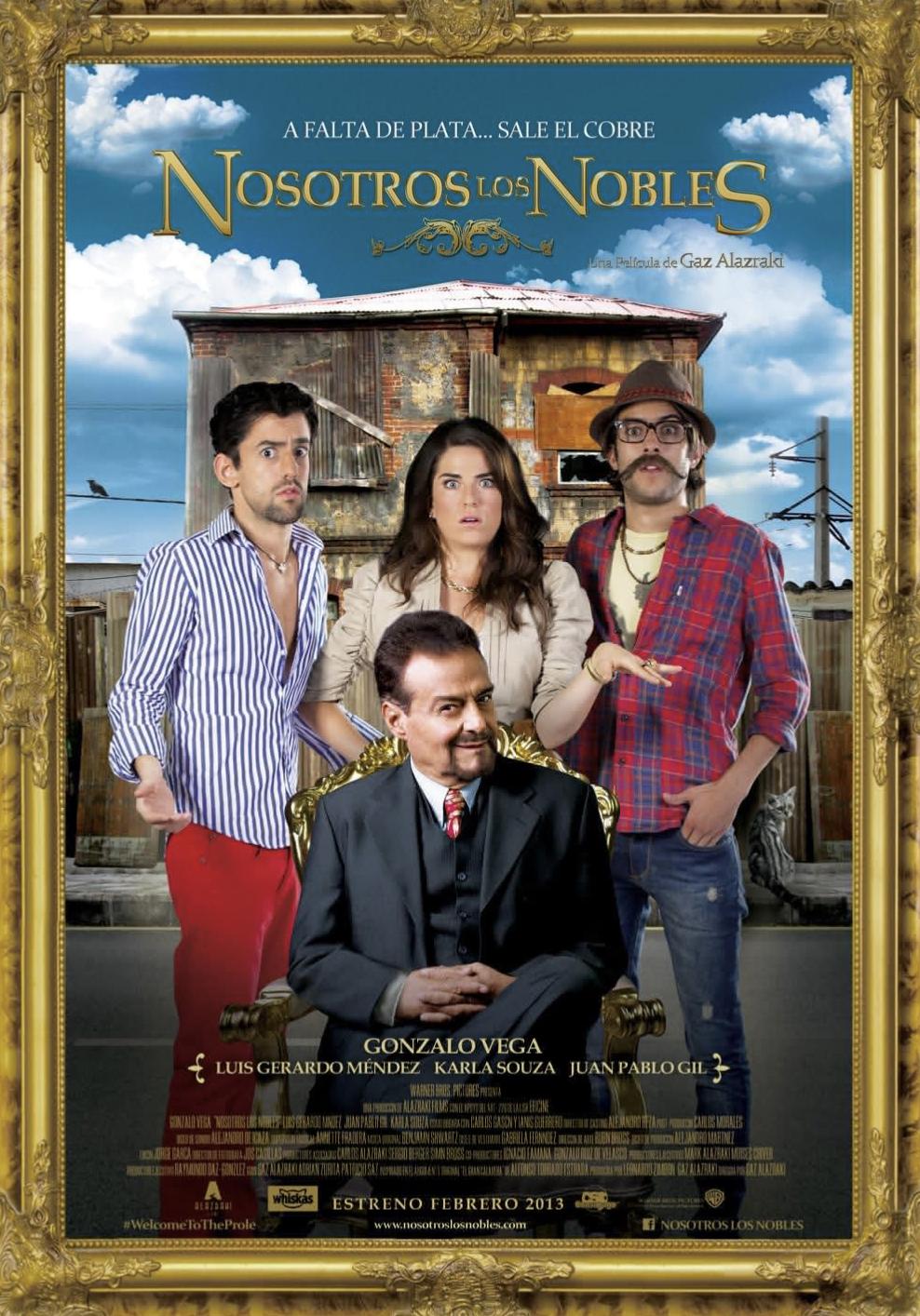
Check out all the IMDb stats on Nosotros Los Nobles.
Watch Nosotros Los Nobles on DVD.
This sharp and entertaining comedy follows a wealthy family whose world is turned upside down when the patriarch tricks them into believing they are bankrupt. His goal? To teach his spoiled children a lesson in humility. What follows is a series of hilarious and sometimes unexpectedly touching moments as they struggle to adapt to a life they never imagined, revealing both the absurdities and the realities of privilege.
With a lighthearted and satirical tone, the film playfully critiques class dynamics while delivering plenty of laughs. Beneath the comedy, it explores themes of family, entitlement, and personal growth, making it both an amusing and thought-provoking watch.
For language learners, the film is a great way to pick up vocabulary related to wealth, class, and social dynamics in Mexico. It also provides insight into Mexican family structures and the generational conflicts that arise when different values clash.
Here are a few key phrases from the movie to look out for:
- "Ya basta." – "Enough already."
- "Esto no es un juego." – "This isn’t a game."
- "La vida no es tan fácil como parece." – "Life isn’t as easy as it seems."
Directed by Gary Alazraki and released in 2013, the film takes place in Mexico City, offering a glimpse into the lives of the country’s upper class fresas. Featuring standout performances from Gonzalo Vega, Karla Souza, and Luis Gerardo Méndez, it became a cultural hit and was nominated for Best Comedy at the Premios Ariel.
With its clever humor and sharp social commentary, this film delivers both entertainment and a satirical look at the meaning of success and family.
15. Nosotros Los Pobres (1948) – Classic Mexican Cinema (Drama) - 2h 8m
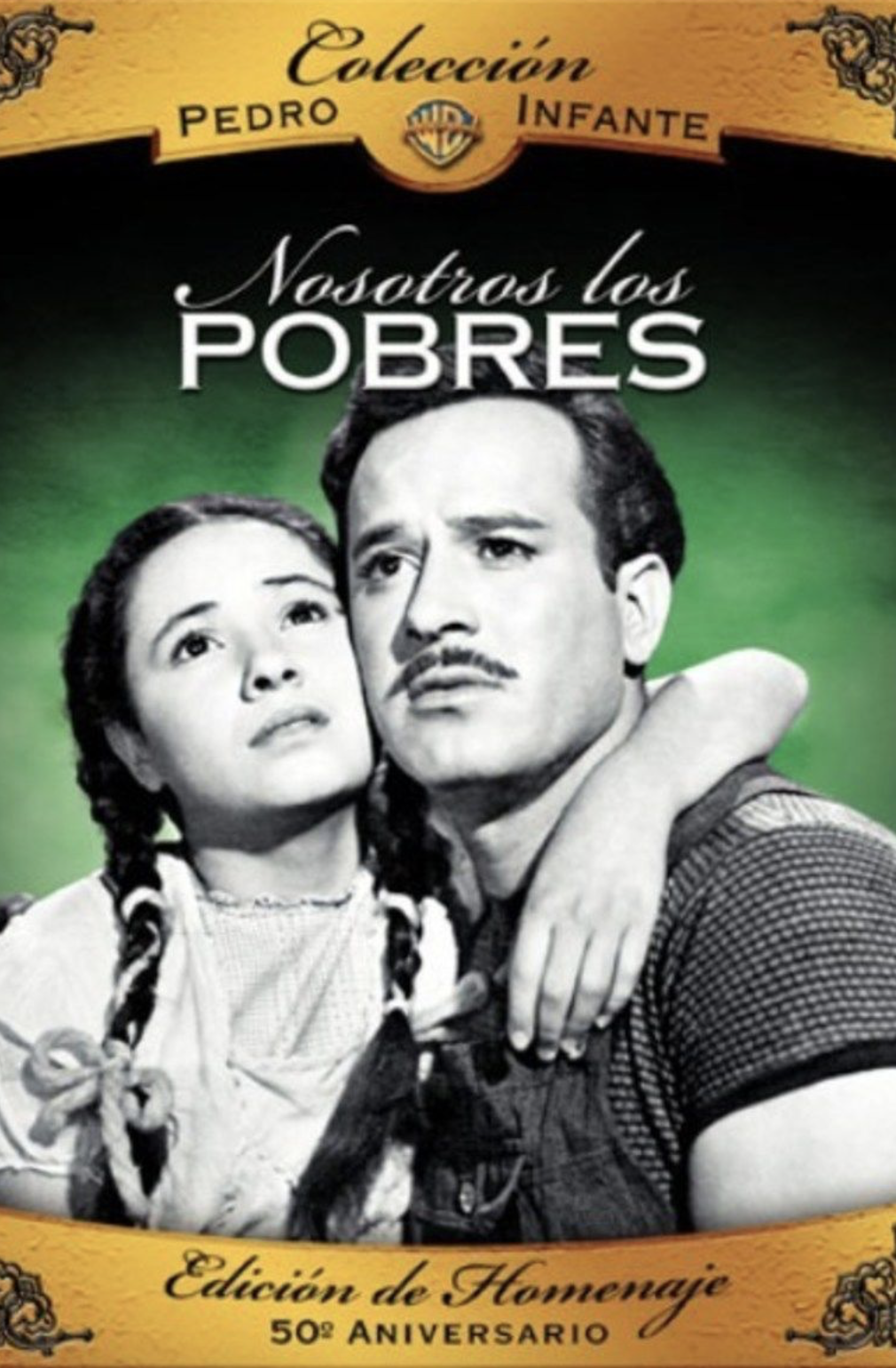
Check out all the IMDb stats on Nosotros Los Pobres.
Watch Nosotros Los Pobres on the Internet Archive or Apple TV .
This classic and deeply moving film tells the story of a poor working-class man in Mexico City as he struggles to provide for his family against overwhelming odds. With heartfelt sincerity, it captures the daily hardships of poverty while showcasing the resilience and determination of a man who refuses to give up, no matter how difficult life becomes.
We The Poor, which has Popcornmeter of 91%, actually is the first of a trilogy preceding Ustedes los ricos y Pepe El Toro.
Rooted in social drama, the film carries a heavy emotional weight, drawing viewers into the personal and often painful realities of survival. Character-driven and deeply human, it focuses on themes of endurance, sacrifice, and the unbreakable bond of family, making it a poignant and timeless story.
For language learners, the film offers a fascinating look at Spanish as it was spoken in the 1940s, providing insight into historical expressions and vocabulary related to survival, labor, and family life. It also serves as a cultural time capsule, offering a glimpse into the struggles of Mexico’s working class during this era.
Here are a few key phrases from the movie to look out for:
- "No te preocupes, todo va a estar bien." – "Don’t worry, everything will be fine."
- "Tenemos que ser fuertes." – "We have to be strong."
- "La vida no es fácil." – "Life isn’t easy."
Directed by Ismael Rodríguez and released in 1948, the film is set in the working-class neighborhoods of Mexico City, immersing viewers in the working class joys and struggles in a very melodramatic way. Pedro Infante is a sight to behold playing Pepe “El Toro”. He works hard as a carpenter to do right by his daughter Chachita played by Evita Muñoz. His sweetheart Celia “La Chorreada” is played by the beautiful Blanca Estela Pavón. The movie earned critical acclaim and was nominated for Best Picture at the Ariel Awards.
With its powerful storytelling and deeply empathetic portrayal of hardship, this film remains a landmark of Mexican cinema, offering both an emotional and historical journey.
Conclusión: ¡Sí Se Puede!
Watching Mexican films is one of the most effective and accessible ways to sharpen your Spanish before a trip to Mexico City. Beyond vocabulary and grammar, these films expose you to natural accents, regional slang, and real-life cultural dynamics—none of which you’ll find in a textbook. You’ll learn how people actually speak, what they joke about, and how they interact in everyday situations.
Whether you're into gritty dramas, indie comedies, or modern classics, the 15 movies on this list will help you build your listening skills and cultural awareness at the same time. It’s a practical, low-effort way to prepare for everything from ordering tacos to holding your own in local conversations.
So queue up a few films this weekend, keep your ears open, and let the language come to you. Your next trip to Mexico City might feel a little more familiar before you even land.
Watch this related Dreaming Spanish video on Beginner Spanish: Sunday walk in Mexico City - Beginner Spanish.
Or this one You WON’T believe we eat this in Mexico - Beginner Spanish.
How about this one: Films in Spanish You Need to Watch - Intermediate Spanish.
Make your Speaking Spanish Dreams Come True. START LEARNING SPANISH TODAY!
Featured author: Joe Bommarito
Joe is a language teacher and freelance writer. He’s taught students in the USA, Korea, Spain, and on iTalki. Two of his favorite activities are walking in the sun and listening to podcasts. If your paths cross, he’d love to invite you to a tasty cuppa coffee. Click here to get in touch with him.

